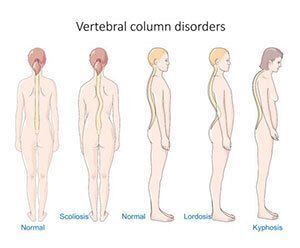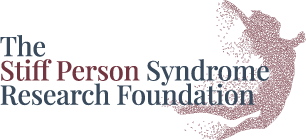Symptoms of SPS
Muscle Rigidity, Stiffness, Painful Spasms
The symptoms of classic SPS are muscle rigidity, stiffness, and painful spasms in muscles of the trunk, including the back, and limbs. The muscle spasms and stiffness are highly variable in their severity and rate of worsening.
Non-linear Symptom Progression
In the early stages of SPS, symptoms of waxing and waning back stiffness may be subtle. Both the spasms and the stiffness can fluctuate a lot on a day-to-day basis and over months and years. The stiffness and rigidity do not necessarily progress at the same rate or intensity as the muscle spasms. There can be periods when the symptoms seem stable and other times when the worsening is more noticeable and rapid. However, for most people there is worsening of stiffness and muscle spasms over the long term. The muscle spasms may be brief, lasting minutes, though at other times can last hours or days and cause severe pain. The fluctuations may be influenced by medications, activity and other interventions.
Changes to Posture
With the continuous back and abdominal muscle contractions which cause the spasms, people can develop an exaggerated sway back posture called lordosis. Some develop a hunched posture in the upper spine, called kyphosis.

Mobility May Be Impacted
The stiffness may affect limbs to a different extent. The stiffness along with rigidity can contribute to an unsteady gait. Walking may become difficult, and people become more prone to falls and injury. Sometimes overall mobility becomes more difficult and a variety of assistive devices including a walker or wheelchair may be necessary.
Increased Stress and Anxiety
The risk of falling may heighten anxiety and lead to reluctance or a fear of leaving one’s home. Living and coping with chronic pain and decreased mobility may also lead to significant emotional depression and anxiety. Many people with SPS endure different degrees of disability, ranging from difficulty walking, even with assistive devices, to being so incapacitated that they are bedridden.
Physical or emotional stress can worsen SPS symptoms, either abruptly or a more sustained worsening. For some people, abrupt loud noises, unexpected physical contact such as being bumped, or just cold weather, can precipitate worsening. This is very unpredictable and variable. These stimuli may trigger a problem one day though not the next. Also, changes in medications or other therapies can sometimes unintentionally worsen symptoms.
Potential Complications with Breathing
There are other less common symptoms with SPS including shortness of breath or a sense of requiring more work to breathe. Some patients report spasms of the face or a change in their appetite (which may also be caused by medications).
Disclaimer: The content of this Website is provided for informational and educational purposes only, and does not in any way intend to substitute for professional medical advice, diagnosis, or treatment. The content is not intended to be medical advice for any particular person or patient and should not be relied upon as medical advice. You should always seek the advice of a physician or other qualified healthcare provider for medical advice, including any questions you may have regarding diagnosis or treatment of any medical condition.
Contributors to this document include: Jim Weiss, MD; Vered Lewy-Weiss, MD; Tara Zier, DDS and SPS patient.

